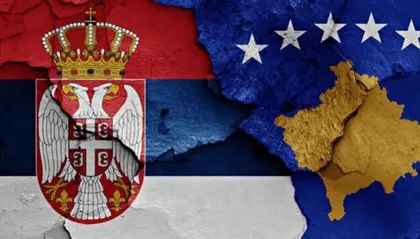Russia is again resorting to dirty tricks to make the world blink, this time as part of a Russian-Serb coalition threatening a possible war between the partially recognized state of Kosovo and Serbia.
Although Kosovo is recognized as an independent country by over 90 states, not all countries have recognized this fact, including not only Russia, but also some EU countries and Ukraine.
JOIN US ON TELEGRAM
Follow our coverage of the war on the @Kyivpost_official.
Between July 31 and Aug. 1, 2022, a dispute between Kosovo with its ethnic Albanian-majority and Serbs (who consider the territory of Kosovo their own) began to develop rapidly over the issuance of auto license plates. According to Serbian President Alexandqr Vucic on PTC Serbian television on Aug. 3, the situation was “one step towards a disaster.”
However, tensions between the countries fell sharply in early August, indicating that the threat was a bluff to draw the attention of world society away from the terrorist attack in occupied Olenivka, Ukraine.
On July 29, the Russian Federation bombed the Olenivka prison, killing more than 50 Ukrainian prisoners of war. Russia accused the Ukraine Armed Forces of striking the prison using the American-donated HIMARS rocket launchers.
When the goal of this bluff was accomplished, tension remained only in words. For example, Serbian President Aleksandar Vucic continued to accuse Kosovo of trying to realize their interests amid “hysteria around the war in Ukraine”.

Latest on Russia’s Intransigence to End War Against Ukraine
Serbian president and the “two chairs”
The Serbian leader has been able to “sit on two chairs” for a long time – to either build relations with the West and a course for EU membership, or support Serbian radicals and friendship with Putin.
However, due to the war in Ukraine, the situation has become somewhat aggravated: the EU expects Serbia to join the sanctions against Russia while the latter has made it clear that Serbia will not forgive it if it does.
Currently, Vucic is trying to maneuver and continue to avoid the need for sanctions against Russia. If Kosovo had not retreated, it would have been a colossal political blow to the Serbian president, most likely leading to his “demise” in the political arena.
The prerequisites for the aggravation of relations
When Kosovo made another attempt to require the exclusive use of Kosovo documents and automobile license plates beginning Aug. 1, Kosovo Serbs built barricades on the roads on July 31 and fired at police. In addition, Serbia brought its army to a state of combat readiness, threatening to protect the Kosovo Serbs.
However, on the night of Aug. 1, the Kosovo government, after meeting with US ambassador Jeffrey Hovenier, delayed implementing the new rules until Sept. 1.
The prerequisites for the start of the military conflict are, however, difficult to follow.
After a meeting with NATO Secretary General Jens Stoltenberg, Vucic was informed on Aug. 3 that NATO forces were ready to intervene in Kosovo as needed.
A meeting in Brussels between Serbia’s president and Kosovo representatives on Aug. 18 is likely to be another verbal intervention. After all, Vucic said that Serbia’s attack on Kosovo, where a NATO contingent is located, is impossible.
However, tensions between the countries persist because Serbia and Kosovo have had this confrontation since 1998.
The symbol of this “hot” relationship has become the city of Mitrovica in northern Kosovo, divided by the river Ibar. Serbs live in the north and Albanians live in the south. The bridge is guarded by Kosovo Force (KFOR) NATO peacekeepers. The Serbian capital, Belgrade, aims to preserve the Serbian presence in the north region and block any integration attempt. Only under such conditions will Serbia still have a chance to return north to Kosovo.
That is why local Serbs have such an acute reaction to the documents order. Moreover, the locals are reassured by the presence of a NATO contingent in the region, which has far more opportunities than Serbia’s army. In addition, Serbia has no reason to attack the KFOR peacekeepers, while Serbia’s main ally, Russia, is currently losing strength in Ukraine and can’t help.
Kosovo’s situation in the political arena
The current situation shows that the West has not found an effective strategy for Kosovo and Serbia. Despite the fact that Kosovo has a European perspective, it has not received the status of candidate or a visa-free status with the EU.
Meanwhile, because Serbia’s government is applying for admission to the EU, starting a war with Kosovo is not a logical solution. Furthermore, Serbia would lose any war because of the presence of a NATO contingent in Kosovo and it would lead to isolation through sanctions.
Ukraine and Kosovo
Back in 2008 when, after the dissolution of Yugoslavia, Kosovo declared its independence, Ukraine was among the states that held back with recognizing it. Official Kyiv argued that it needed to uphold the principle of territorial integrity.
However, after Russia’s full-scale invasion of Ukraine, Ukraine’s relations with Kosovo have been strengthened. The Kosovo government regularly expresses support for Ukraine in its statements, condemns Russia’s actions, and blocks Russia’s propaganda media. In addition, Kosovo has also trained Ukrainian citizens in demining, sent food and clothes packages, is hosting and paying for the accommodation of Ukrainian journalists, is part of Ukraine defense group, etc.
On August 6, the MP Oleksiy Honcharuk, submitted a bill to the Verkhovna Rada proposing the recognition of Kosovo’s independence.
Are we about to see a change in Ukraine’s official position vis a vis a friendly Kosovo still under threat from a pro-Russian Serbia?
You can also highlight the text and press Ctrl + Enter










